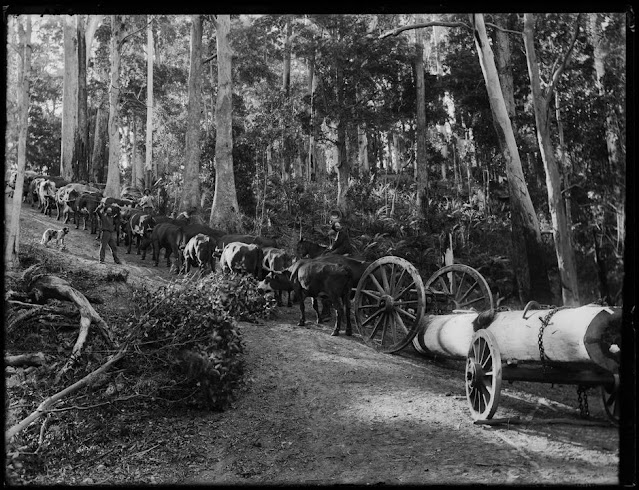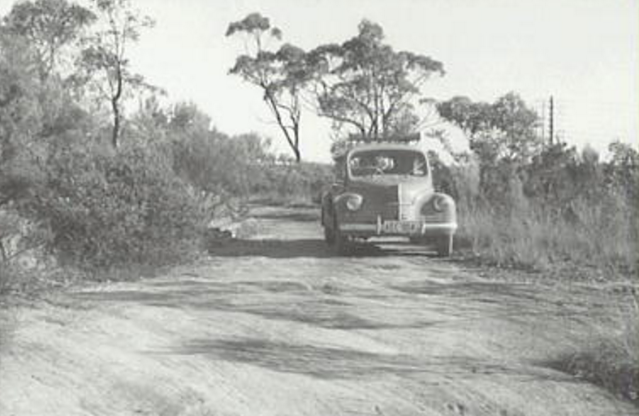As we drive on our modern roads and freeways, there is never a thought for the horsetracks and wagon trails that were the original source.
This is the subject of a poem by Banjo Paterson, commented upon by Don Burns at:
Time appears to have stood still for over a hundred years when I travel quietly along our picturesque back roads. These roads, the scenery and the tranquility remain much the same as our WW1 soldiers would have remembered them.My mind turns to thinking about why and when some of these roads were first upgraded from rough tracks, how the hard men from earlier generations used muscle, picks and shovels, horses and carts to clear the bush, overcome steep gradients, skirt the waterways and improve access between the farms, forests, dairies, churches, mines, towns and ports that sustained our pioneering forebears.Banjo Paterson wondered about the history of our roads. He wrote, in the last verse of Black Harry's Team:-The tourist folk would be amazedIf they could get to knowThey take the track that Black Harry blazedA hundred years ago.
Her is Banjo Paterson’s poem:
Black Harry's Team
No soft-skinned Durham steers are they,
No Devons plump and red,
But brindled, black and iron-grey
That mark the mountain-bred;
For mountain-bred and mountain-broke,
With sullen eyes agleam,
No stranger's hand could put a yoke
On old Black Harry's team.
Pull out, pull out, at break of morn
The creeks are running white,
And Tiger, Spot and Snailey-horn
Must bend their bows by night;
And axles, wheels, and flooring boards
Are swept with flying spray
As shoulder-deep, through mountain fords
The leaders feel their way.
He needs no sign of cross or kirn
To guide him as he goes,
For every twist and every turn
That old black leader knows.
Up mountains steep they heave and strain
Where never wheel has rolled,
And what the toiling leaders gain
The body-bullocks hold.
Where eagle-hawks their eyries make,
On sidlings steep and blind,
He rigs the good old-fashioned brake---
A tree tied on behind.
Up mountains, straining to the full,
Each poler plays his part---
The sullen, stubborn, bullock-pull
That breaks a horse's heart.
Beyond the farthest bridle track
His wheels have blazed the way;
The forest giants, burnt and black,
Are ear-marked by his dray.
Through belts of scrub, where messmates grow
His juggernaut has rolled,
For stumps and saplings have to go
When Harry's team takes hold.
. . . . . . . . . . .
On easy grade and rubber tyre
The tourist car goes through,
They halt a moment to admire
The far-flung mountain view.
The tourist folk would be amazed
If they could get to know
They take the track Black Harry blazed
A Hundred Years Ago.
A. B. Paterson
Bullock team hauling wool on a dray, Walcha, New South Wales
A colour postcard printed of a team of 26 bullocks carting a large load of wool ca. 1909.
Until 1900, bullock teams were the main form of bush transport. With 16 bullocks, this Northland team was unusually large. The animals are joined with wooden yokes and coupling chains. The drivers carry long whips, which often had lancewood handles and flax lashes. The whips were cracked as much to emphasise verbal commands as to inflict pain.
A bullock team hauling a log along a road in rainforest probably in New South Wales. Bullocks could work in situations unsuitable for horse teams, negotiating rough and rutted tracks over steep terrain. Bullock drivers or 'bullockies', were rough though highly skilled characters who guided their beasts with word and gesture, reserving the long bullock whip to urge the team though heavy going.
Cox's Road (Great Western Highway), Woodford in 1929. Note the solid sandstone rock forming the road base.
For many years though, travel through the Blue Mountains was difficult. Cox’s Road to Bathurst was little more than a dirt track and it took at least two days for a horse and carriage to make the trip, with an overnight stop at one of the many inns that were slowly springing up along the road. (1) The discovery of payable gold at Ophir in 1851 led to rising numbers of travellers on the road and the need for a railway was fast becoming evident.







No comments:
Post a Comment
Note: Only a member of this blog may post a comment.